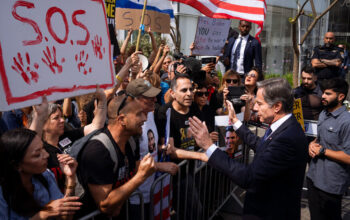
Gunfire rings out. Rumors spread of a military takeover. The president is nowhere to be seen. The nation turns on the television and collectively switches to the state channel, where they see new leaders, wearing berets and fatigues, announce that the Constitution has been suspended, national assembly dissolved, borders closed.
In the past 18 months, in similar scenes, military leaders have toppled the governments of Mali, Chad, Guinea, Sudan and now, Burkina Faso. West African leaders on Friday called an emergency summit on the situation in Burkina Faso, where the new military leader, Lieutenant Colonel Paul-Henri Damiba, told the nation in his first public address on Thursday night that he would return the country to constitutional order “when the conditions are right.”
The resurgence of coups has alarmed the region’s remaining civilian leaders. Ghana’s President Nana Akufo-Addo said on Friday, “It represents a threat to peace, security and stability in West-Africa.”
These five nations that have recently experienced military coups form a broken line that stretches across the wide bulge of Africa, from Guinea on the west coast to Sudan in the east.
First came Mali, in August 2020. The military took advantage of public anger at a stolen parliamentary election and the government’s failure to protect its people from violent extremists, and arrested President Ibrahim Boubacar Keita and forced him to resign on state television. Mali actually had two coups in a nine-month span.
An unusual coup unfolded in Chad in April 2021. A president who had ruled for three decades was killed on the battlefield, and his son was quickly installed in his place — a violation of the Constitution.
In March 2021, there was a failed coup attempt in Niger, then in September 2021, it was Guinea’s turn: A high-ranking officer trained by the United States overthrew a president who had tried to cling to power. Then in October, it was Sudan’s: The country’s top generals seized power, tearing up a power-sharing deal that was supposed to lead to the country’s first free election in decades.
That’s more than 114 million people now ruled by soldiers who have illegally seized power. There were four successful coups in Africa in 2021 — there hadn’t been that many in a single calendar year since 1999. United Nations Secretary General Antonio Guterres called it “an epidemic of coup d’états.”
Why so many coups in so short a time?
Coups are contagious. When the Malian government fell, analysts warned that Burkina Faso could follow. Now that it has, they’re warning that if the coup plotters aren’t punished, there will be more coups in the region.
Understand the Sudan Coup
On Oct. 25, a coup led by the military derailed Sudan’s transition to civilian rule and plunged the country back into fear and uncertainty.
People are fed up with their governments for many reasons — major security threats, relentless humanitarian disasters and millions of young people having no prospects.
Governments are performing abysmally, said Abdul Zanya Salifu, a scholar at the University of Calgary who focuses on the Sahel, the swath of Africa that lies just below the Sahara. So, he said, the military thinks: “You know, why not take over?”
All three Sahelian countries with recent coups — Mali, Burkina Faso and Chad — are grappling with Islamist insurgencies that keep spreading, capitalizing on local tensions and grievances against political elites.
The coup in Mali happened partly because of the government’s failure to stem the spread of groups loosely allied to Al Qaeda and the Islamic State. In Burkina Faso, an attack last November that left almost 50 military police officers dead is considered a key event that led to the coup two months later.
Millions of people across the Sahel region have been displaced, and thousands are dead — and often, people say that politicians seem not to notice or care, driving fancy cars and sending their children to expensive foreign schools. It’s an explosive cocktail.
How are these military takeovers greeted by the people?
While their president was imprisoned at a military base, hundreds of Malians celebrated with soldiers in the streets. Not everyone supported the coup. But the junta’s popularity has grown, even though it seized power again in May of 2021 — the second putsch in an unsettling nine-month span — this time from the civilian leaders who had been appointed to lead the transition to elections.
The regional economic bloc, ECOWAS, imposed punishing sanctions that were partly intended to turn Malians against the junta, putting pressure on the military leaders to commit to a speedy election timetable.
But “what’s happening is the exact opposite,” said Ornella Moderan, head of the Sahel Program at the Institute for Security Studies, which is based in Pretoria, South Africa. The sanctions have caused anger, but against ECOWAS, not the junta. The military rulers, seen as standing up to self-interested foreigners, now have overwhelming support, according to analysts and local news reports.
In neighboring Guinea, some initially greeted the coup leader as a liberator, but many also shut themselves up at home, afraid for the future.
In Burkina Faso, a country that has experienced a lot of coups, there were a handful of pro-putsch rallies the day after the military seized power, but many people just went to work as usual.
Some said they were inspired by the way the junta in neighboring Mali had stood up to France, the increasingly unpopular former colonial power.
“Whoever takes power now, he needs to follow the example of Mali — reject France, and start to take our own decisions,” said Anatole Compaore, a customer in a cellphone market in Ouagadougou, in the early hours of the coup.
The pro-military sentiment does not extent to Sudan. There, a popular uprising had succeeded in overthrowing a military dictator in 2019, but there has been sustained public outrage since last October when the military took back full control of the government, and detained the civilian prime minister who had served in what was supposed to be a power-sharing government.
If they can take down governments, are the militaries in these countries very strong?
Not necessarily. Mali and Burkina Faso’s armed forces have little to no control over vast areas of their territories, and lean heavily on self-defense militias with little training and questionable human rights records. Chad’s military is considered one of the continent’s strongest, yet it has failed to stop deadly attacks by Boko Haram and its splinter group, Islamic State West Africa Province, an insurgency that is now a decade old. The military also couldn’t stop Chad’s president, Idris Déby, a retired general, from being killed on the battlefield as rebels tried to overthrow his government.
Paradoxically, the weakness of Burkina Faso’s armed forces was a major factor in the coup. Last November, 49 military police officers and four civilians were killed in the northern outpost of Inata. Both the military and the public were outraged that their officers were not well-enough equipped or trained to withstand such an attack.
“It set the stage for this takeover,” said Mr. Salifu.
There’s a belief that strongmen can better face the security risks, especially in the Sahelian countries where violence is spiraling, said Anna Schmauder, a research fellow focused on the Sahel in the conflict research unit of the Dutch think tank Clingendael.
But a military takeover doesn’t necessarily lead to a more effective response against insurgencies — continuing attacks in Mali are evidence of that, she said. Ultimately, said Ms. Schmauder, “Military powers are kind of there to stay, and doing everything to cement their own power.”
How have regional and international powers responded?
African and international organizations have reacted with disapproving statements and sanctions, and in Mali, the threat that a regional standby force will invade — but few take the latter very seriously.
The African Union suspended Mali, Guinea and Sudan, but not Chad — a double standard that analysts warned could have dire consequences for Africa. For some, this was evidence that the African Union has become little more than a weak and biased dictators’ club.
After the coup in Burkina Faso, the regional economic bloc, ECOWAS, released a statement saying that such a move “cannot be tolerated,” and instructing the soldiers to return to their barracks. But it was not clear what ECOWAS could do, given its dubious record mediating in Mali.
Powers farther afield haven’t done much better. The United States, the European Union and France endorsed the sanctions on Mali, but at the U.N. Security Council, Russia and China blocked a statement supporting them.
International powers insist that the military rulers should hold swift elections. But this demand angers some people who think that the military is acting in the country’s interest.
Mali also had a coup in 2012, and many Malians feel that after that, their country did everything the West demanded of it with regard to democracy, such as holding elections quickly. But that solved nothing: Insecurity got worse; corruption and living standards, no better.
“There is this notion that bad elections are worse than no elections at all,” said Ms. Moderan. “We should actually address the political system that’s not working.”
And this is a problem everywhere that the West “fetishizes” sticking to a strict electoral calendar, said Mr. Salifu, while ignoring or downplaying other elements of democracy — like a free press, freedom from political repression or human rights.
All the attention goes to “organizing periodic elections, which in most cases are rigged,” he said.
As in Mali, many in Burkina Faso said they had lost faith in democracy, including Assami Ouedraogo, 35, a police officer who resigned in November. “If we wait until the next elections in 2025 to change leaders, our country will no longer exist,” he said.
Declan Walsh contributed reporting from Ouagadougou.



